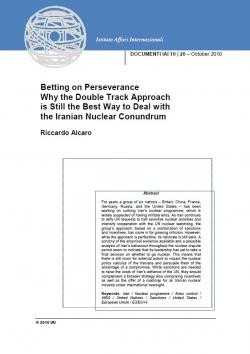Betting on Perseverance. Why the Double Track Approach is Still the Best Way to Deal with the Iranian Nuclear Conundrum
For years a group of six nations – Britain, China, France, Germany, Russia, and the United States – has been working on curbing Iran’s nuclear programme, which is widely suspected of having military ends. As Iran continues to defy UN requests to halt sensitive nuclear activities and intensify cooperation with the UN nuclear watchdog, the group’s approach, based on a combination of sanctions and incentives, has come in for growing criticism. However, while the approach is perfectible, its rationale is still valid. A scrutiny of the empirical evidence available and a plausible analysis of Iran’s behaviour throughout the nuclear dispute period seem to indicate that its leadership has yet to take a final decision on whether to go nuclear. This means that there is still room for external actors to impact the nuclear policy calculus of the Iranians and persuade them of the advantage of a compromise. While sanctions are needed to raise the costs of Iran’s defiance of the UN, they should complement a broader strategy also comprising incentives as well as the offer of a roadmap for an Iranian nuclear industry under international oversight.
Document prepared for the broader research project on "Exploring the potential and limits of CFSP: the E3/EU action on Iran's nuclear issue" funded by the Compagnia di San Paolo within the framework of the EU-wide programme "European Foreign and Security Policy Studies" (EFSPS), jointly developed by the Compagnia di San Paolo, the Riksbankens Jubilaeumsfund, and the Volkswagen Stfitung.
-
Details
Roma, Istituto affari internazionali, October 2010, 19 p. -
In:
-
Issue
10|20
Introduction
1. An historical review of the nuclear standoff with Iran
2. The double track approach
2.1. The sanctions track
2.2. The diplomacy track
3. Why it is sensible to uphold the double track approach
3.1. Iran is unlikely to have taken a final decision on weapon capability
3.2. Iranian leadership’s opportunism can be turned into an opportunity
3.3. Sanctions only work if part of a broader policy
3.4. It is imperative to bolster the diplomatic track
3.5. Measuring the double track approach against other options
Conclusion



